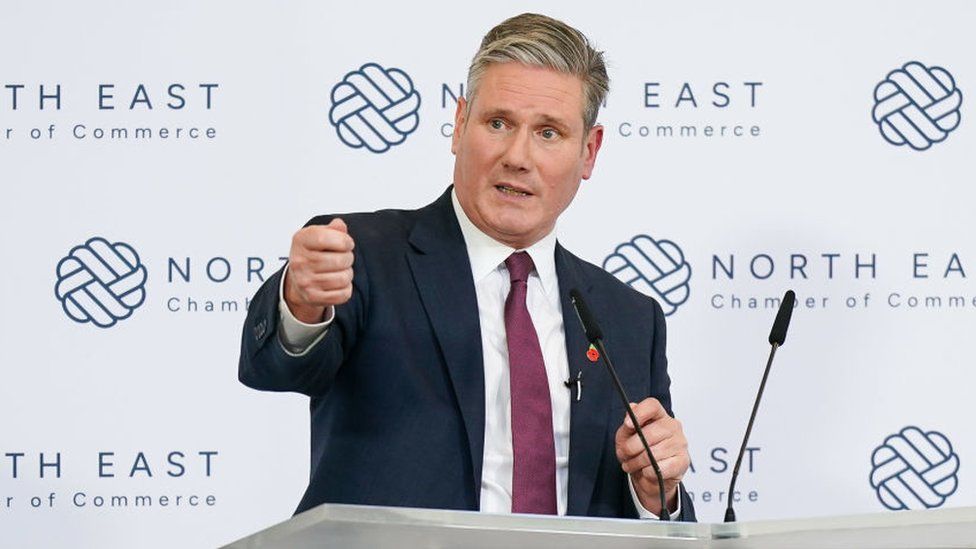ARTICLE AD BOX
 Image source, Getty Images
Image source, Getty Images
By Michael Race
Business reporter, BBC News
Sir Keir Starmer is to warn that the UK will face "huge constraints" on public spending if his party win the next General Election.
On Monday, he will say anyone expecting an incoming Labour government "to quickly turn on the spending taps is going to be disappointed".
Growing the economy is set to be a battleground for both Labour and the Conservatives at the next election.
The Conservatives claim Labour's borrowing plan would raise taxes.
Rishi Sunak, the prime minister, has made economic growth one of his key pledges.
The cost of living in the UK has put the economy at the centre of political debate as inflation and high interest rates put pressure on household budgets.
The UK has not slipped into recession but there have been concerns over weak growth.
The Bank of England's governor, Andrew Bailey, said last week that productivity rates in the UK "concern me a lot".
In a speech to economists and think-tanks later on Monday, Sir Keir will say economic growth "will have to become Labour's obsession if we are to turn around the economy".
But he will argue that decisions taken from the government and previous Conservative administrations for the past 13 years "will constrain what a future Labour government can do".
"The comparison between 2010 and today is instructive," the Labour leader will say.
"Now, debt and interest rates are much higher. Britain's standing is diminished. Growth is stagnant and public services are on their knees."
"Taxes are higher than at any time since the war, none of which was true in 2010. Never before has a British government asked its people to pay so much, for so little."
His comments will come after his party denied claims it could further water down its flagship green prosperity plan.
A senior source had suggested to the BBC that the level of investment previously promised - of £28bn a year - might never be reached.
In June Rachel Reeves, the shadow chancellor, watered the pledge down. Senior source in the Labour leader's office said the decision was made because of the state of the public finances.
However, a Conservative spokesman said Labour's policy "presents a major risk" to the British economy at a time when the cost of borrowing is "so high".
Richard Holden, the Conservative party chairman, said: "The largest 'constraint' to growing the economy would be Labour's £28bn a year borrowing plan - which independent economists warn would see inflation, interest rates and people's taxes rise".
As well as focusing on growth, Sir Keir will outline his plans which include changing "restrictive planning laws and get Britain building again" and creating a "proper industrial strategy drawn up with business".
He will also declare Labour would secure "a new deal to make work pay with increased mental health support, fully-funded plan to cut NHS waiting lists, an end to zero hour contracts, no more fire and rehire, and a real living wage".
The government has announce it will increase the minimum wage by more than a pound to £11.44 next April, but the government's forecaster, the Office for Budget Responsibility (OBR), has said living standards are also not expected to return to pre-pandemic levels until 2027-28.
Sir Keir will say that the current parliament is "on track to be the first in modern history where living standards in this country have actually contracted".
Most recent official figures show the economy failed to grow between July and September, after a succession of interest rate rises that have increased borrowing costs.
Chancellor Jeremy Hunt announced several tax cuts in his autumn statement.
But the decisions will not prevent taxes staying at their highest level on record and economic growth is forecast to be sluggish.
Sir Keir will also say in his speech that "it's not the case that 'any growth' will do".
"No, we can't be agnostic about the sort of growth we pursue, anymore. The growth we need must better serve working people. And must raise living standards in every community," he will argue.

 1 year ago
25
1 year ago
25








 English (US) ·
English (US) ·